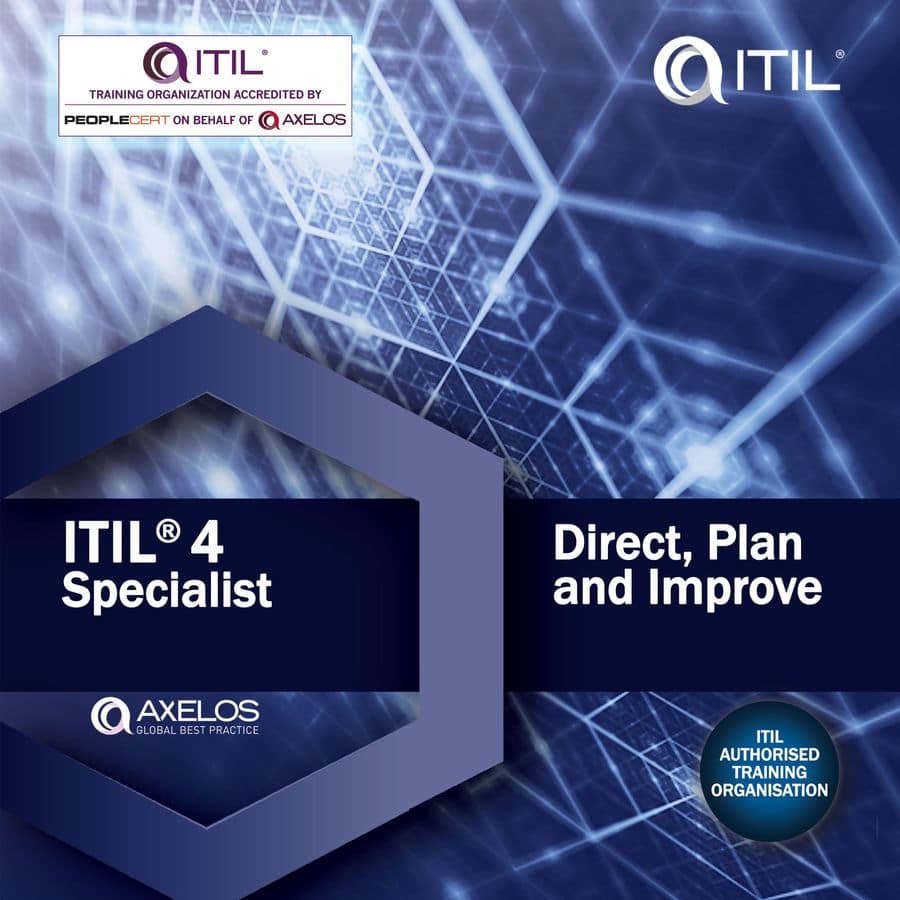 ITIL® 4 Specialist
ITIL® 4 Specialist
Direct, Plan and Improve
The accredited ITIL® 4 Specialist - Direct, Plan and Improve course is designed to provide IT practitioners with an understanding of service quality and improvement methods, enabling them to continue to deliver innovative yet reliable tech-enabled services to their customers in an increasingly competitive market.
Delivered in partnership with ACG (Adelaide Consulting Group).
Learn from certified experts who also write the course.
Globally accredited Authorized Training Organization Via Peoplecert
on behalf of AXELOS.
Live Online: 3 days Fee: $2100 Inclusions: 2 Exam Vouchers
Course Overview
Audience:
The ITIL® (4) Foundation course targets candidates in the IT and business domains who wish to take first steps into service management. Previous candidate that are familiar with earlier versions of ITIL and/or other sources of industry best practice and wish to learn about ITIL 4 will also benefit. This course and the related certification can be beneficial for the following roles:
- IT Service Management
- Operations and Incident management
- IT Change & Release management
- IT Supplier & Vendor management
- Business Analysis and Design
- Business analysts & Service desk analysts
- IT Architects
- Development
- IT Project & Program Management
- Risk and Compliance
- Information Security management
Benefits
The benefits for you to move to ITIL® 4 are:
- Keeping your Best Practice skills up to date
- Use the latest knowledge to save money and time at work
- Better understand the current concepts used by Best in Class service providers (Dell, HP, Microsoft, Amazon, Google)
Duration:
2 day course
Prerequisites:
There are no pre-requisites for this course, however it is assumed that course participants are working or have worked in an IT environment or equivalent.
Inclusions
All full paying students get access to the following:
- Expert instruction for entire ITIL4 Foundation Course
- 1 x Printed or PDF student manual (Your Choice)
- 2 x Exam vouchers (Exam can be taken at anytime from your own PC – 12 months expiry for the vouchers.*)
- Access to eLearning site and all additional resources
- Access to Champions portal for self-assessment
- Mock exams, additional readings, and handouts (PDF format)
- Pre exam coaching, tips and tricks review session
- Access to certified Expert via online forum and LMS support
- Participation in this course gives you 20% discount on all intermediate ITIL4 Courses
Course Content

The ITIL 4 DPI course provides the practical skills necessary to create a “learning and improving” IT organisation, with a strong and effective strategic direction. With the help of ITIL 4 concepts and terminology, activities, exercises, and examples included in the course, you will acquire relevant knowledge to pass the ITIL 4 DPI certification exam.
The course is designed to provide practitioners with a practical and strategic method for planning and delivering continual improvement with the necessary agility. It is aimed at managers of all levels involved in shaping direction and strategy or developing a continually improving team. It will cover both practical and strategic elements.
The ITIL 4 DPI module is common to both ITIL 4 streams: Managing Professional and Strategic Leader:
- The Managing Professional (MP) stream provides practical and technical knowledge about how to run successful IT-enabled services, teams and workflows
- The Strategic Leader (SL) stream recognises the value of ITIL, not just for IT operations, but for all digitally-enabled services
This course also includes a copy of the ITIL DPI Handbook, containing practical material for reference back in the workplace.
Skills Gained
The purpose of the ITIL 4 DPI module is to provide candidates with an understanding of:
- the key concepts of Direct, Plan and Improve
- the scope of what is to be directed and/or planned, and know how to use key principles and methods of direction and planning in that context
- the role of Governance, Risk and Compliance (GRC) and know how to integrate the principles and methods into the service value system
- how to use the key principles and methods of continual improvement for all types of improvements
- how to use the key principles and methods of Organisational Change Management to direction, planning and improvement
- how to use the key principles and methods of measurement and reporting in directing, planning and improvement
- how to direct, plan and improve value streams and practices
- how to manage risks in an effective way during direction, planning, and improvement
- how to manage portfolios and make effective decisions
- how to develop an effective business case
- how to direct strategies and actions through Governance, Risk, and Compliance (GRC)
- how to develop meaningful, detailed value stream maps (VSM)
- continual improvement of the service value chain and practices
Examination
The course pricing includes the ITIL 4 Strategist: Direct, Plan and Improve (DPI) Exam at the end of day 3 of the course. It is a 90-minute closed book exam consisting of 40 multiple choice questions and a pass mark of 70% (28/40). Practice exam papers and questions are provided, and reviewed to assist in preparation.
It is highly recommended that you spend some time each evening of this course reviewing and consolidating what you’ve learned, to be well prepared for the exam.
Module 1: Understand the key concepts of Direct, Plan & Improve
Understand the following key terms:
• Direction
• Planning
• Improving
• Operating model
• Methods
• Risks
• Scope of control
Understand the differences between the following key concepts:
• Vision and Mission
• Strategy, Tactics and Operations
• Governance, compliance and management
• Policies, Controls and Guidelines
Understand the concepts of Value, Outcomes, Costs & Risks and their relationships to direction planning & improvement
Module 2: Understand the scope of what is to be directed and/or planned, and know how to use key principles and methods of direction and planning in that context
• Know how to cascade goals and requirements
• Know how to define effective policies, controls and guidelines
• Know how to place decision-making authority at the correct level
Module 3: Understand the role of GRC and know how to integrate the principles and methods into the service value system
• Understand the role of risk and risk management in DPI
• Understand how governance impacts DPI
• Know how to ensure that controls are sufficient, but not excessive
Module 4: Understand and know how to use the key principles and methods of continual improvement for all types of improvements
Know how to
• use the ITIL continual improvement model to improve the service value system or any part of the SVS
• identify assessment objectives, outputs, requirements and criteria
• select an appropriate assessment method for a particular situation
• define and prioritize desired outcomes of an improvement
• build, justify and advocate for a business case
• conduct Improvement reviews
• Analysis of lessons learned
• embed continual improvement at all levels of the SVS
Module 5: Understand and know how to use the key principles and methods of Communication and Organizational Change Management to direction planning and improvement
Understand the nature, scope and potential benefits of Organizational change management
• Know how to use the key principles and methods of Communication & OCM
a) Identify and manage different types of stakeholders
b) Effectively communicate with and influence others
c) Establish effective feedback channels
• Know how to establish effective interfaces across the value chain
Module 6: Understand and know how to use the key principles and methods of measurement and reporting in direction, planning and improvement
• Know how to define indicators and metrics to support objectives
Module 7: Understand and know how to direct, plan and improve value streams and practices
• Understand the differences between value streams and practices and how those differences impact direction, planning and improvement
• Know how to select and use the appropriate methods and techniques to direct, plan and improve value streams and practices
a) Addressing the 4 dimensions
b) Applying the guiding principles
c) Value stream mapping
d) Optimization of workflow
e) Elimination of waste
f) Ensuring & utilizing feedback
